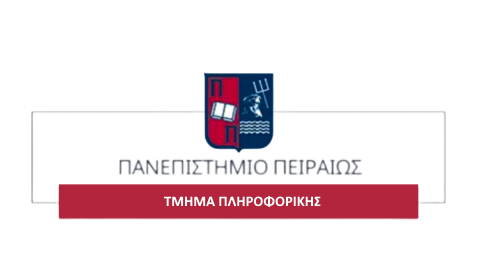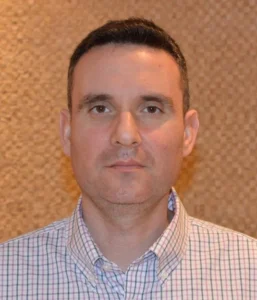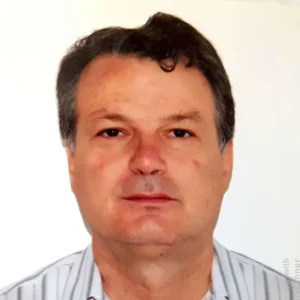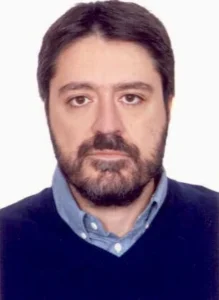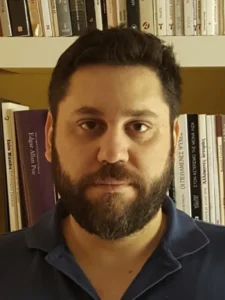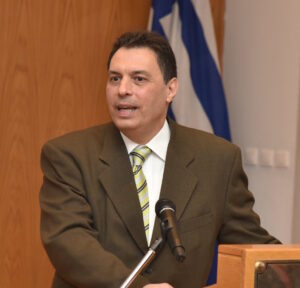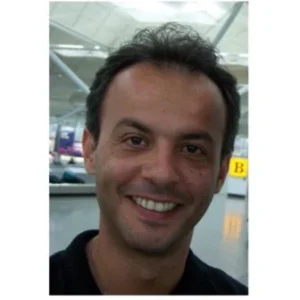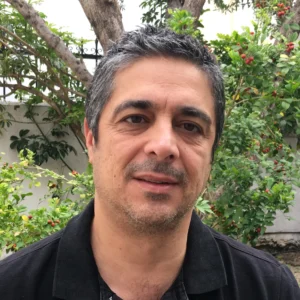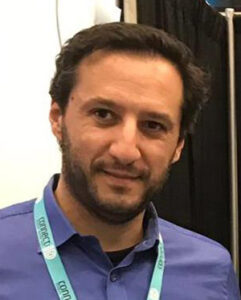Department of Informatics
27 January 2024 2024-01-28 13:16Department of Informatics
Contact Information:
Address: 80 Karaoli & Dimitriou Str., 185 34, Piraeus
Email: plh-secr@unipi.gr
Phone: +30 210 414-2067, -2437, -2105, -2263
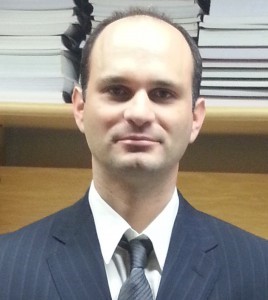
MESSAGE FROM THE HEAD OF DEPARTMENT
PROFESSOR EFTHIMIOS ALEPIS
Welcome to the web site of the Department of Informatics of the School of Information and Communications Technology University of Piraeus. Our website provides information on research, academic, teaching and administrative structures and activities of our Department, thus highlighting their contribution in Greece and abroad.
Information technology is an exciting science that is constantly evolving and always has a great need for further academic research and demand in the labor market with an upward trend. Not the Department of Informatics, University of Piraeus, is a department with a strong position in the Greek and international scientific events. The Department of Information Technology operating since 1991 and is one of the oldest IT Departments in Greece.
The Department of Information Technology operates the undergraduate curriculum with 3 directions, and two Postgraduate Programs (masters), which are upgraded periodically to reflect current developments in computer science. One master degree is titled “Advanced Information Systems” and provides highly skilled in Informatics in 6 directions. The program is aimed at graduates department. The other master degree entitled “Information Technology” and provides high knowledge and specialization in Informatics for graduates of other disciplines but wish to gain deep knowledge and high specialization in Informatics. In addition, the IT Department enables remote monitoring conducted seminars in many current issues of IT aimed at the general public. The seminars take place in a e-learning program.
The Department of Information conducted excellent research, documented in a large number of publications in international journals and conferences prestige. The Department has repeatedly distinguished internationally for research conducted with awards “best work” in international conferences and journals. It also organizes a large number of prestigious international conferences with the participation of leading scientists and scientific organizations abroad, which preside Professors of the department. The last five years have been organized about 30 such conferences. In this way, the IT Department contributed greatly to the international scientific visibility of Piraeus University and the entire country.
Many professors of the Computer Science Department shall act as Head Curator (Editor-in-Chief) or State Council Clerks (Editorial Board Member) important international scientific journals and thus contribute to the shaping of developments in Science and Technology Information Technology globally.
The graduates (undergraduate and postgraduate study programs) have high absorbency in the labor market in Greece and abroad, as evidenced by the statistics keeps the University of Piraeus Liaison Office. Still, many of the graduates have excelled in Greek and abroad in the fields of Information technology.
All previously recognized as achievements of the IT Department by the external evaluators. Indeed, the IT Department has completed the external assessment procedure by a committee composed by leading professors abroad, with the committee chairman Professor Demetri Terzopoulo, University of California, Los Angeles. In the report of the external evaluation recognized the high level of provided undergraduate and graduate education and the significant involvement of the IT Department in the international research scene.
For example, it states that certain research activities of the Department have prominent visibility (visibility) nationally and internationally, that “the depth and breadth of the doctoral activity was found to be impressive,” that “the curriculum of postgraduate programs of the Department of Informatics is very well defined and the results show that accomplished excellent work “that” research guided by faculty members and often performed by graduate students of very high quality (based on Greek and international standards).”
Another important international recognition of the IT Department is reflected in academic search appliance results Microsoft Academic Search that has created the familiar Microsoft company. According to the tool, University Piraeus ranks in the top 100 in the world, in position 73, for the area of Information Technology Computer Education, among 4333 other universities and organizations worldwide. The same appliance ranks the leading scientists of this region and other regions, members of the Department of Information among tens of thousands of scientists worldwide.
Recently, on April 29, 2014, the Department had us another great honor, with the ceremony an honorary doctorate, Professor of Informatics, Prof. Joseph Sifakis, who is the only Greek and one of the few European scientists received the Turing Award, considered equivalent to the Nobel for Informatics. We were fortunate to welcome him and to our academic community.
Professor Efthimios Alepis
Head of Department of Informatics

A few words about the department
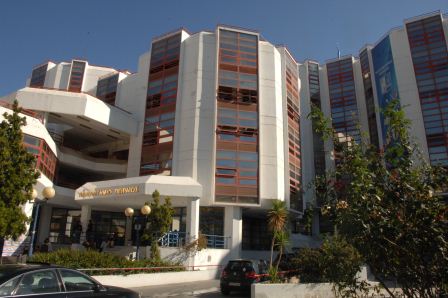
The Department of Informatics of the University of Piraeus was founded with a F.E.K. of 1991 and has been operating since 1992. It is one of the oldest Departments of Informatics in Greece.
The main axes of the Department are education and research. The training is provided at 3 levels. At the first level, undergraduate studies are provided with the admission of students from the country’s Panhellenic exams leading to the acquisition of a Degree in Informatics. The second level offers postgraduate studies leading to the acquisition of a Master’s Degree and the third level offers doctoral studies leading to the acquisition of a PhD degree.
The UNDERGRADUATE PROGRAM (B.Sc.) provides solid education in all subjects of modern IT science in line with current IT developments worldwide.In the 3rd year of studies, it is possible to choose one of the 3 offered tracks:
- Software Technology and Intelligent Systems,
- Information systems and Services and
- Networks and Computer Systems.
It is also possible to obtain a Teaching Proficiency so that graduates of the Department can teach IT at secondary and primary education level
Also, 2 Postgraduate Programs operate in collaboration with other departments.
In the Department of Informatics, high-level research is carried out, which is documented in a large number of publications in prestigious international journals and conferences. The Department has repeatedly been distinguished internationally for the research it conducts with “best papers” awards at international conferences and journals. Based on the research conducted in the research laboratories of the Department of Informatics, according to the Microsoft Academic Search academic tool that analyzes data from 25827 Universities and Organizations worldwide, the University of Piraeus is ranked the 1st leading University in the world for the research areas: Mobile Authoring Tools, Adaptive Teaching, Visual facial emotion recognition, Software personalization based on student modeling. It is still ranked 5th globally in the broad areas of 1. Educational Software and 2. User Modeling.
The Department of Informatics has completed its external evaluation process by top Professors from abroad in accordance with the procedures of the National Authority for Higher Education (ETHAAE). The external evaluation report recognizes the high level of undergraduate and postgraduate education provided and the significant participation of the Department of Informatics in international research. It is reported that some research activities of the Department have prominent visibility at the national and international level, that “the depth and breadth of PhD activity was found to be impressive”, as well as “the curriculum of the Graduate Programs of the Department of Informatics is very well defined and the results show that excellent work is being done”.
The following statutory laboratories and research groups operate in the Department:
- Laboratory of Software Technology.
- Laboratory of Information Systems.
- Laboratory of Decision Support Systems.
- Laboratory of Internet and Telecommunication Services and Security Systems.
- Laboratory of Artificial Intelligence and Virtual Reality.
- Laboratory of Integrated Computer Systems.
- Cyber-Security Research Laboratory.
- Laboratory for the Recognition of Standards and Machine Learning – Multimedia.
- Laboratory of Discrete Mathematics and Theoretical Informatics.
- Laboratory of Digital Culture, Smart Cities, IoT and Advanced Digital Technologies & Services.
Postgraduate Programmes
The Department of Informatics of the University of Piraeus organizes and operates 4 Postgraduate Programmes (M.Sc.):
- Sc. in “Advanced Informatics and Computing Systems – Software Development and Αrtificial Intelligence”.
- Sc. in “Digital Culture, Smart Cities, IoT and Advanced Digital Technologies”.
- Sc. in “Cybersecurity and Data Science”.
- Sc. in ” Informatics”, which is a programme aimed at graduates of other sciences who wish to specialize in Informatics.
Research
The quality of the Department’s research is reflected in the number of scientific journals that publish it, in the scientific training and expertise of the faculty members, in the participation of dedicated and capable PhDs and Postdoctoral researchers, as well as in the research activities that take place in the Department.
The Department conducts research work – in which students are encouraged to participate – in a multitude of fields. For more information, students can contact the Department’s research laboratories.
Pedagogical Proficiency
According to the 13/06/2019 decision of the Assembly of the Department of Informatics and the 27/06/2019 decision of the Senate of the University of Piraeus, regarding the acquisition of the Pedagogical and Teaching Proficiency from the Special Study Program of Undergraduate Study Program of the Department of Informatics, the following apply:
1. The number of courses deemed satisfactory for the acquisition of pedagogical and teaching proficiency is six (6), with a total number of teaching units of thirty (30).
2. The Department of Informatics will offer a total of eight (8) courses in the context of the Special Study Program of Pedagogy and Teaching Proficiency (SSP_PTP).
3. Of the six required courses, two (2) are compulsory courses with credit units, which, however, are not included in the students’ grade point average. The remaining four (4) are either all electives or three (3) elective courses and one (1) major course from those offered in the Undergraduate Study Program.
4. The set of eight (8) courses will constitute the new Special Study Program of Pedagogy and Teaching Proficiency (SSP_PTP), which all students of the Department of Informatics will be able to attend and ensure the pedagogical and teaching proficiency of those graduates who attended and were examined successfully in six (6) EPS_PDE courses (2 Compulsory and 4 Electives), a total of 30 ECTS (6*5).
5. Students will be given the possibility to declare additional courses in each semester from 3rd to 8th so that the choice of courses in different directions is not circumvented. Therefore, students should be given the opportunity to choose and be examined in more courses than are absolutely necessary to obtain a degree, adding the rest to the diploma appendix.
6. The choice of courses that are included in the final grade of the degree should not be related to the possible acquisition of proficiency but should be decided by the student with a declaration to the Department Secretariat during the declaration phase.
7. It is pointed out that the last course to be submitted to the Department’s secretariat will be the Bachelor’s Thesis and beyond that there will be no possibility of any change.
Internship
The purpose of the Internship is to acquaint students of all study levels with the working reality of IT science and the application of theoretical knowledge in a real environment. More specifically, the Internship aims to:
A. adaptation of students to workplaces and the practice of their skills and abilities,
B. full utilization of the knowledge students have acquired during their studies,
C. strengthening the learning process through real working conditions,
D. creation of new opportunities for professional orientation and professional rehabilitation for the graduates of the Department of Informatics,
E. exploitation by the Department of Informatics of the experience gained by the students by adapting it to the educational process.
The Internship is optional for the students of the Department of Informatics, has a minimum duration of two (2) calendar months and a maximum of twelve (12) and refers to students of all levels (cycles) of studies. Employment refers to full-time man-month equivalents and can be either full-time or part-time with variable hours. The calendar duration of the contract will be adjusted accordingly, depending on the hours of employment, so that it corresponds to full-time man-months. The details of the terms of employment are described in the contract. The internship can be carried out internally or externally and take place whenever a student maintains his/her status as a student, especially for undergraduate students, as long as they have completed their first year of study.
The program is included as an optional elective course in the curriculum of the Department of Informatics and as an activity in the Department’s Master’s and Doctoral Study Programs (if it does not exist as a course), while its evaluation is based on the report of the student interns submitted after the completion of their internship .
In the Undergraduate Study Program, the grade of the course is indicated in the student’s analytical grade, when he registers for the Practicum course for the first time. In case the student performs an internship at home or abroad more than once (if allowed) e.g. execution through a Co-financed or other project, and through Erasmus+, or through a Co-financed or other project more than once, or through agencies, or any combination is allowed, then the grade entered in the Internship Course is the grade chosen by the student during examination period that declares the course for the first time, while the other Practical Exercise(s) and the relevant grade are listed in the Diploma Supplement and are not counted in the Final Grade. In the event that he never declares the Internship course, then the Internship and the relevant grade is listed in the Diploma Supplement. In the case of Master’s Degree Programs, if it does not exist as a course, then the Internship and the relevant grade are listed in the Diploma Appendix.
The new University of Piraeus Department of Informatics Studies Program aims to fulfill to the greatest extent possible the following objectives:
- Alignment with current guidelines internationally defined in the IT sector and the labor market needs,
- Identifying the specific identity of the Department by establishing guidelines adequately treat for undergraduate level domains-edge IT,
- Create a “nursery” for young scientists integrating modern subjects and courses in conjunction with the already deployed Graduate Programs Department.
To fulfill these objectives in the new curriculum introduced in the last two years of study in three directions,
- Software Engineering and Intelligent Systems
- Online and Computer Systems
- Information Systems and Services
which will provide necessary and useful for undergraduate, specialization that makes the Department students competitive in the labor market and ready to meet the modern requirements in the scientific arena of Information Technology.
The first four (4) semesters (1st and 2nd year) are common to all students of the department. In four (4) last semesters (3rd and 4th year) established three directions:
Technology of Software and Intelligent Systems (TSIS): The rapid development of computers that is marked by increased computing power, increased memory capacity and specialized peripherals, has allowed the dissemination of advanced and demanding programming techniques and even in personal computer level. These techniques are treated by the disciplines of Software Engineering, Graphics and Virtual Reality, Artificial Intelligence and Intelligent Systems of pattern recognition as well as the most advanced techniques Human Computer Communication. This orientation aims to provide undergraduate students on the one hand the necessary background, on the other, those special knowledge to be able to meet development and research in the area of modern and advanced software development techniques.
Network and Computing Systems (NCS): The convergence of information technology and telecommunications, the explosive growth of the Internet and the exponential changes in complexity and system speeds that support these technologies, requires the acquisition of specialized knowledge in the disciplines of web or net-centric systems and computer systems necessary for the deployment of these technologies. The curriculum in this direction enables students to gain in principle the basis for understanding, operation and use of these technologies and then be provided with the necessary skills for the development, maintenance and optimization of systems operating in a web environment.
Information Systems (IS): The development, implementation and management of modern information systems requires a wide range of knowledge mentioned in information and communication technologies, and business administration, as information systems are acceptable to users and to successfully integrate the business operations. The aim of the direction of this is to provide to students the necessary knowledge department, theoretical and practical, on the methodologies and technologies for the development of modern information systems, project management processes related to the development of information systems and established information management methods systems. Illustration, special emphasis is placed on issues analysis methodologies and systems planning, design and development of efficient databases, computer networks, development of information systems based on business processes, workflow systems and information security.
The Department of Informatics, University of Piraeus, organizes and operates two postgraduate programs:
– M.Sc. in “Advanced Informatics and Computing Systems – Software Development and Αrtificial Intelligence”.
– M.Sc. in “Digital Culture, Smart Cities, IoT and Advanced Digital Technologies”.
– M.Sc. in “Cybersecurity and Data Science”.
– M.Sc. in “Informatics”.
The M.Sc. in “Advanced Informatics and Computing Systems – Software Development and Αrtificial Intelligence” aims at the coordinated development and organization of the research directions of the computer science and Information Technology and in particular those that concern high priority areas for our country.
The content and profile of the program has been developed to respond successfully to the particular scientific needs of the rapid development of Information Technology and New Technologies at European and international level.
Both compulsory courses and elective courses have been selected to provide the postgraduate student with the expertise required by the latest technological developments in the field of Information Technology, in combination with the particular characteristics and needs of modern Greek and European Economy and Digital Agenda.
The aims of the Postgraduate Program M.Sc. in “Advanced Informatics and Computing Systems – Software Development and Αrtificial Intelligence” of the Department of Informatics of the University of Piraeus are as follows:
- The promotion of science and research in the field of program tracks.
- The preparation and training of qualified and competent scientists and researchers to promote the development of the country and Greek enterprises in the Information Society and New Technologies and in specialized fields such as Digital Culture.
- Preparing for postgraduate studies at doctoral level.
- The development of Theoretical and Applied Informatics in Greece and Internationally.
- Close cooperation between the Academic Community, Industry and Businesses for the acceptance, use and dissemination of the most advanced Information Technology New Technologies and Services.
- The collaboration between Greek, European and International Scientific Organizations and Agencies, dealing with IT and Cultural Technology issues.
The Postgraduate Programme awards a Master of Science (M.Sc.) Degree in “Advanced Informatics and Computing Systems – Software Development and Αrtificial Intelligence” at the following Tracks:
- Intelligent Technologies for HCI.
Advanced Software Development Technologies.
Artificial Intelligence and Smart Software Applications.
The M.Sc. in “Digital Culture, Smart Cities, IoT and Advanced Digital Technologies” has as subject the coordinated development and organization of the research tracks of the science of new Technologies, especially those that are relate to high priority areas for our country, such as Digital Culture, Smart Cities, Internet of Things (IoT), and Modern Communications and Digital Technologies.
The M.Sc. awards a post-graduate diploma with title “Digital Culture, Smart Cities, IoT and Advanced Digital Technologies”) with the following three (3) specializations: “Digital Culture”, “Smart Cities and Advanced Digital Technologies” Technologies, “Internet of Things (IoT) and Advanced Digital Technologies”. The M.Sc. is addressed to graduates from different scientific fields.
The Specialization / Track “Digital Culture” aims at the education and training of scientists of various specialties from theoretical, positive and technological fields of knowledge for the making, protection, promotion and management of the cultural stock with the contribution of advanced digital technologies. It equips students with the appropriate knowledge of the latest global trends in the emerging interdisciplinary field of digital culture and ensures the design and formulation of a new digital strategy in culture. It promotes the preservation and enhancement of the cultural heritage in our country by highlighting new ways of effectively managing cultural organizations in the wider context of social and educational policy. It incorporates modern cognitive fields including 3D modeling, the implementation of Virtual Reality, Augmented Reality, Virtual Worlds, mobile communications, Internet and social media technologies, signal processing and multimedia, with final aiming at optimal digital management, recording and editing of the cultural heritage and the aspects of modern culture. As our country has a rich cultural reserve on a continent (Europe) that is also the cultural superpower, enhancing interdisciplinarity will help reinforce the Creative Industry, protect our cultural heritage and stimulate modern creation.
The Specialization / Track “Smart Cities and Advanced Digital Technologies” aims to educate and train scientists from different fields so they can work in the new digital urban landscape as well as design and support new services in the ever-changing “Smart Cities” linked to the modern ecosystem, infrastructure, functions and services, like smart transportation, communication, smart homes, e-Government, smart grids, smart cultural heritage, smart health, smart agriculture, intelligent digital infrastructure, intelligent energy management. It also aims to provide expertise to manage complex urban issues, to provide the necessary resources for developing innovative systems of governance for a safe and sustainable city, for designing and supporting operational and effective resource-saving methods, and intelligent management of disasters.
The Specialization / Track “Internet of Things (IoT) and Advanced Digital Technologies” aims to educate and train scientists from different fields, but mainly from the fields of science and technology, to provide the appropriate knowledge to design, manage and support new services on the IoT platforms, to manage complex projects, to provide the necessary resources for the design and development of appropriate and innovative systems and services, the analysis of large data, the provision of expertise in the design of interdependent IT systems linked to the functions of digital city, smart homes, transportation, construction, energy, smart grids, intelligent health, smart farming, intelligent security, services, communications, smart digital infrastructure, education, smart security, governance systems development, data security, privacy protection – integrity of personal data, attacking internet intrusions, protecting devices from attacks, interoperability of systems and devices.
Graduates of the Postgraduate Program can work in public administration, municipalities, regions, technology and research centers, a number of stakeholders in Culture and Tourism, R & D departments in small and medium-sized enterprises, and large companies, companies involved with innovation in Culture and Tourism and the implementation of technological solutions. The knowledge they will gain will enable them to engage in professional advice and entrepreneurship on smart cities, digital culture, modern digital services, telecommunication and networks, including businesses, energy and telecommunications network operators, regulators, private and public operators. Graduates also have the opportunity to pursue their careers in existing organizations, to acquire the necessary skills and knowledge necessary for areas such as Public Administration and Ministries, Municipalities, Regions, Technological and Research Centers, and to continue their studies at a Ph.D. Level as well as start their own innovative businesses.
The M.Sc. in “Cybersecurity and Data Science” serves computer scientists and IT professionals who wish to enroll in post graduate computer science studies and learn the recent advancements in the fields of Computer and Infrastructure Security and Data & Business Analytics. These fields exhibit rapid scientific development, high dynamics and an ever-increasing demand in the European and global market. The program awards a Postgraduate Diploma (MSc) in “Cybersecurity and Data Science” with the following three tracks:
- Information and Communication Systems Security (ICSS)
- Embedded Systems Security and Reliability (ESSR)
- Business and Data Analytics (BDA)
The Information and Communication Systems Security (ICSS) track focuses on the study of the latest technologies and methods for cybersecurity. Based on a modular program the students will be able to gain a deep knowledge of core cybersecurity topics including security governance, security architecture design, network security, software security, penetration testing, digital forensics and malware analysis. At the same time, the students will be able to focus on their personal scientific background and interests, through selective courses in special topics of security and privacy, but also to enrich their knowledge with topics related with system reliability and data science. The students have to successfully follow a number of courses that sums up to 30 ECTS per semester. During the 1st and 2nd semester, the track offers 4 obligatory courses and several selective courses on security, while the students may also select 1-2 courses from other tracks. The 3rd semester is devoted to the Diploma Thesis in a state-of-the-art topic in cybersecurity, supervised by one of the instructors of the track.
The Embedded Systems Security and Reliability (ESSR) track focuses on the study of the latest technologies and methods for the design of Secure and Reliable Embedded Systems, Internet-of-Things (IoT), and Critical Infrastructures. The track program has been carefully designed to provide the students with knowledge and skills in the fields of security and reliability of computing systems including Embedded System Design, Secure IoT Applications, Dependable Systems, Security Architecture Design, Software Security, Hardware Security, and Embedded Systems Reliability. The students have to successfully follow a number of courses that sum up to 30 ECTS per semester. The track offers 5 obligatory courses with 24 ECTS in total in the 1st semester and 3 obligatory courses with 18 ECTS in total in the 2nd semester, while the students may be granted the required ECTS per semester by attending 1 or 2 elective courses or obligatory courses from other tracks. The 3rd semester is devoted to the Diploma Thesis in a state-of-the-art topic in the fields of security and reliability of computing systems, supervised by one of the instructors of the track.
The Business and Data Analytics track consists of a number of advanced courses in the field of Data Science. In order to fulfill their obligations, students have to successfully follow a number of courses that sums up to 30 ECTS per semester. During the 1st semester the track offers 7 courses and during the 2nd semester, the track offers 6 courses (both compulsory and elective courses). The students may also select 1-2 courses from other tracks as elective courses, in order to sum up to 30 ECTS per semester. The 3rd semester is devoted to the Diploma Thesis in a state-of-the-art Data Science topic, supervised by one of the instructors of the track.
The Master Program in “Informatics” has the objective of sound and high education graduates parts AEI and TEI various disciplines on the principles and methodologies of application of modern computer science.
The M.Sc. in “Informatics” cure modern technology issues and applications of computer science in other modern sciences. The content and character of the program is configured to respond successfully to the specific scientific needs arising from the rapid development of Information and applications at European and international level.
The master lessons have been carefully chosen to provide a complete basic knowledge of computer science for applicants.
Both taught core courses and the elective courses have been selected to provide the graduate student specialization required by the latest technological developments in the IT sector and in particular its applications relating to other sciences.
The doctoral program of the Department aims to conduct high-quality research and excellent training of young researchers, in accordance with international standards of computer science.
Application and registration process
Candidates apply to the Special General Assembly to the Department Secretariat. The Secretariat checks whether the candidates have the typical ‘requirements, as provided by applicable law and these Rules of the master program and forward the applications of candidates, together with the supporting documents submitted to the Special General Assembly, which decides whether to admit Department doctoral candidates.Thereafter, if the application is accepted, the Special General Assembly appoints the supervisor according to the candidate’s application and establish a three-member Advisory Committee of the candidates in accordance with the proposal of the supervisor.
The Special General Assembly is able to call for expression of interest doctoral candidate positions on specific subjects. The relative expression of interest published in the press, on notice boards of the department, and electronic.
Conditions of participation
In preparing the thesis candidates must meet the following conditions:
• Be graduates of University Departments (Universities and TEI). domestic or equivalent recognized institutions abroad.
• Hold a Master’s degree holders or equivalent MSc University Departments of Greek or equivalent recognized universities abroad. For post-graduate degree courses from university abroad, it is necessary to recognize that title from DOATAP.
• Have sufficient knowledge of English to be certified by either complete training abroad or at least language certificate equivalent to the First Certificate.
Reguired documents
• Reguest of interested.
• Detailed CV.
• First degree in any specialty from a recognized educational institution.
• Master’s diploma type (MBA, M.Sc.) in a related field from an accredited Foundation.
• Transcripts from undergraduate and postgraduate studies.
• Proficiency Proof of English Language.
Professors
Associate Professors
Assistant Professors
Emeritus Professors
| Ονοματεπώνυμο | Βαθμίδα |
| Alexandris Nikolaos | Emeritus Professor |
| Asimakopoulos Nikitas | Emeritus Professor |
| Georgiakodis Michael | Emeritus Professor |
| Georgiakodis Fotios | Emeritus Professor |
| Despotis Dimitrios | Emeritus Professor |
| Panagiotopoulos Antonios | Emeritus Professor |
| Panagiotopoulos Ioannis-Christos | Emeritus Professor |
| Sapounakis Aristides | Emeritus Professor |
| Tsikouras Panagiotis-George | Emeritus Professor |
| Fountas Evangelos | Emeritus Professor |
PostDoctoral Researchers
| Name | Supervisor | Title | |
| Anastasakis Georgios | anastas@unipi.gr | ||
| Vaidis Timoleon | |||
| Vlachos Aristeidis | avlachos@unipi.gr | ||
| Gizelis Christos-Antonios | |||
| Zorbas Dimitrios | |||
| Theocharopoulos Ioannis | |||
| Karagiorgou Sophia | karagior@unipi.gr | ||
| Karantjias Athanasios | |||
| Karvounidis Theodoros | |||
| Katsionis Georgios | gkatsion@unipi.gr | ||
| Manes Konstantinos | kmanes@unipi.gr | ||
| Petrantonakis Pavlos | papetr@unipi.gr | ||
| Skondras Emmanouil | skondras@unipi.gr | ||
| Tselikis Christos | ctseliki@unipi.gr |
PhDs
| Name | Date of Proclamation |
| Papathanasiou Eleni | 10/4/1995 |
| Peppes Dimitrios | 24/01/2000 |
| Poulos Marios | 4/2/2002 |
| Mpeletsiotis Vasileios | 29/5/2002 |
| Mavromatis Georgios | 29/5/2002 |
| Zacharis Nikolaos | 1/7/2002 |
| Gkirtis Konstantinos | 20/12/2002 |
| Mountrdou Maria | 13/12/2002 |
| Papadakis Ioannis | 17/2/2003 |
| Kotzanikolaou Panagiotis | 18/5/2003 |
| Tsirigka Victoria | 2/7/2003 |
| Vosinakis Spyridon | 2/7/2003 |
| Magkos Emmanouil | 2/7/2004 |
| Kampasi Aikaterini | 22/12/2003 |
| Vlachos Aristidis | 9/2/2006 |
| Kotsimpos Georgios | 14/3/2006 |
| Maragkos Ilias | 14/3/2006 |
| Riggas Anastasios | 2/11/2006 |
| Markopoulos Evangelos | 6/7/2007 |
| Dimitriadis Christos | 6/7/2007 |
| Katsionis Georgios | 19/9/2007 |
| Mitrokosta Aikaterini | 12/11/2007 |
| Ntoutsi Eirini | 10/9/2008 |
| Fountas Chrisostomos | 26/11/2008 |
| Artikis Konstantinos | 26/11/2008 |
| Fretzons Ilias | 16/10/2008 |
| Patsakis Konstantinos | 16/10/2008 |
| Dimitriou Nikolaos | 19/2/2009 |
| Alepis Efthimios | 6/4/2009 |
| Petrantonakis Pavlos | 23/3/2009 |
| Xenoulis Georgios | 27/4/2009 |
| Mavropodi Rosa | 11/6/2009 |
| Tasoulas Ioannis | 30/6/2009 |
| Tsitsamis Dimitrios | 30/6/2009 |
| Papastergiou Spyridon | 14/10/2009 |
| Patsos Dimitrios | 14/10/2009 |
| Serrelis Emmanouil | 14/10/2009 |
| Apostolakis Andreas | 10/11/2009 |
| Avramidis Agapios | 9/12/2009 |
| Derpanis Dimitrios | 9/12/2009 |
| Stathopoulou Ioanna-Ourania | 30/6/2009 |
| Theocharopoulos Ioannis | 26/1/2010 |
| Marketos Gerasimos | 26/1/2010 |
| Lampropoulos Aristomenis | 13/4/2010 |
| Tselikis Christos | 17/12/2009 |
| Anastasakis Georgios | 13/4/2010 |
| Kotsifakos Evangelos | 23/6/2010 |
| Savvopoulos Anastasios | 13/4/2010 |
| Lampropoulou Paraskevi | 21/7/2010 |
| Kastaniotis Georgios | 30/3/2011 |
| Kalovrektis Konstantinos | 30/3/2011 |
| Triantafyllou Andreas | 4/5/2011 |
| Meneklis Vasileios | 24/2/2011 |
| Tourtoglou Kalliopi | 23/6/2011 |
| Zormpas Dimitrios | 23/6/2011 |
| Fragkakis Michail | 20/7/2011 |
| Ninios Georgios | 21/12/2011 |
| Manos Konstantinos | 21/12/2011 |
| Zintzaras Ilias | 21/12/2011 |
| Glynos Dimitrios | 20/9/2012 |
| Pirounias Sotirios | 20/9/2012 |
| Ntouskas Theodoros | 11/10/2012 |
| Pentafronimos Georgios | 11/10/2012 |
| Miridakis Nikolaos | 22/11/2012 |
| Mermigkas Dimitrios | 18/12/2012 |
| Petikas Isidoros | 18/12/2012 |
| Sotiropoulos Dionysios | 7/12/2010 |
| Aleksopoulos Spyridon | 28/2/2013 |
| Giatrakos Nikolaos | 28/2/2013 |
| Chimos Konstantinos | 28/2/2013 |
| Karvounidis Theodoros | 13/6/2013 |
| Kampisioulis Pabagiotis | 23/1/2014 |
| Manes Konstantinos | 13/3/2014 |
| Chrysafiadi Konstantina | 13/3/2014 |
| Dellios Kleanthis | 26/1/2010 |
| Nikolidakis Stefanos | 29/4/2015 |
| Valiakos Athanasios | 21/7/2015 |
| Christodoulakis Nikolaos | 21/7/2015 |
| Drosos Dimitrios | 23/2/2016 |
| Mastorakis Konstantinos | 23/2/2016 |
| Aroukatos Nikolaos | 31/3/2016 |
| Georgakakis Emmanouil | 31/3/2016 |
| Liagkouras Konstantinos | 11/5/2016 |
| Drosos Christos | 6/7/2016 |
| Zacharakis Evangelos | 9/3/2017 |
| Sotiros Dimitrios-Georgios | 9/3/2017 |
| Koutanis Dimitrios | 9/3/2017 |
| Koronakos Grigorios | 19/5/2017 |
| Tantouris Nikolaos | 19/7/2017 |
| Trousas Christos | 20/12/2017 |
| Zigomitros Athanasios | 5/4/2019 |
| Katsikogiannis Georgios | 20/7/2018 |
| Krouska Akrivi | 21/05/2019 |
| Skondras Emmanouil | 17/09/2019 |
| Kotsifakos Dimitrios | 11/01/2020 |
| Tampakis Panagiotis | 20/2/2020 |
| Almalis Nikolaos | 15/10/2020 |
| Vlahakis Georgios | 3/11/2020 |
| Politou Evgenia | 23/12/2020 |
PhD Candidates
| Surname | Name |
| Almabrok | Abdo-Alnasir |
| Avrantinis | Nikolaos |
| Aggelaki | Maria-Eftyxia |
| Adam | Konstantinos |
| Alogogianni | Eleni |
| Antoniadis | Rallis |
| Apostolatos | Ioannis |
| Apostolopoulos | Theodoros |
| Vavoysis | Aleksandros |
| Varsos | Dimitrios |
| Vasilakopoulos | Vasileios |
| Veneti | Afroditi |
| Vlagkoylis | Vasileios |
| Vontas | Marios |
| Garofalaki | Zaxarenia |
| Giotis | Theofanis |
| Gkotsinas | Antonios |
| Gkotsiopoulos | Panagiotis |
| Grigoriadis | Xristos |
| Gryllakis | Fragkiskos |
| Deirmentzoglou | Evaggelos |
| Drakoulis | Savvas |
| Drakoulogkonas | Panagiotis |
| Efstathiou | Dimitrios |
| Zogkou | Maria |
| Zoumi | Eirini |
| Zoannos | Nikolaos |
| Theoxaris | Stamatios |
| Kallergis | Dimitrios |
| Kalligkatsis | Ioannis |
| Kalogeraki | Eleni-Maria |
| Kalogeropoulos | Panagiotis |
| Kamitsios | Margaritis |
| Karalis | Apostolos |
| Katsikatsos | Georgios |
| Katsipis | Mixail |
| Kontova | Xrisoula |
| Kontogianni | Aristea |
| Kontoulis | Ioannis |
| Kopanaki | Despoina |
| Koutras | Dimitrios |
| Koutsantonis | Dionusios |
| Krasadakis | Panteleimon |
| Kritsis | Kosmas |
| Kiranoudi | Pinelopi |
| Kupriadis-Spuridonidis | Damianos |
| Kuriakidis | Simos |
| Lampropoulos | Georgios |
| Linardatos | Gerasimos |
| Likousas | Nikolaos |
| Mathioudakis | Dimitrios |
| Makrodimitris | Georgios |
| Malamas | Evaggelos |
| Mamalis | Ioannis |
| Matzavela | Vasiliki |
| Miliaresi | Ioanna |
| Milioris | Konstantinos |
| Miaris | Aleksandros |
| Mikeli | Aggeliki |
| Missos | Panagiotis |
| Mougiakou | Eirini |
| Mourikis | Evaggelos |
| Nika | Xristina |
| Nikolaou | Spuridon |
| Nomikos | Konstantinos |
| Ksesternos | Chrusostomos |
| Ksimeris | Georgios |
| Papageorgiou | Axilleas |
| Papadimitriou | Spuridon |
| Papathanasiou | Anastasios |
| Papaioannou | Panagiotis |
| Papanikas | Dimitrios |
| Pappas | Dimitrios |
| Patsi | Dimitra |
| Petrakos | Nikolaos |
| Petrou | Xrusanthi |
| Petrou | Petros |
| Platias | Nikolaos-Aleksandros |
| Pliota | Theodora |
| Poutos | Kuriakos |
| Rigos | Konstantinos |
| Sari | Aitzan |
| Sarris | Antonios |
| Seralidou | Eleni |
| Skartsis | Nikolaos |
| Souvatzoglou | Ioanna |
| Stellios | Ioannis |
| Sfakianakis | Emmanouil |
| Sotiropoulos | Andreas |
| Tamilias | Aleksandros |
| Tzoumpa | Dimitra |
| Tigkas | Odusseas |
| Triantafullou | Andreas |
| Trixas | Ioannis |
| Tsantilis | Ioannis |
| Tsounis | Ioannis-Άggelos |
| Tsolis | Nikolaos |
| Fountas | Ioannis |
| Fragkiadaki | Despoina |
| Chalaris | Άggelos |
| Chantzis | Fotios |
| Chatzisofroniou | Georgios |
| Chourdaki | Pelagia |
| Chronakis | Aristeidis |
| Psarra | Evgenia |
- Secretariat of the Department of Informatics
The building of the Secretariat of the Department is located in Piraeus at 80-82 Zeas Street (1st floor). The Secretariat serves undergraduate students every Monday-Wednesday-Friday, 11:30-14:00. The Secretariat of the Department of Informatics consists of four members:
| Name | Office | Telephone | |
| Vasiliki Gkotsi (Head of Secretariat) | Zeas 80-82 | +30 2104142097 | bgotsi@unipi.gr |
| Evgenia Tomara | Zeas 80-82 | +30 2104142437 | eugenia@unipi.gr |
| Aristea Katsiadrami | Zeas 80-82 | +30 2104142067 | aristeakats@unipi.gr |
| Maria Giannouli | Zeas 80-82 | +30 2104142114 | marygian@unipi.gr |
Fax.: 210-4142107
Secretariat email: plh-secr@unipi.gr
- Secretariat of the Head of the Department of Informatics
The Secretariat of the Head of the Department of Informatics is located in the main building of the University of Piraeus at 80 Karaoli & Dimitriou (5th floor) and serves only in matters concerning the President of the Department as well as the Graduate Programs of the Department.
| Name | Office | Telephone | |
| Aikaterini Kanatoula | Central Building/503 | +30 2104142105 | psp@unipi.gr |
| Efthimia Alamanioti | Central Building/503 | +30 2104142263 | infodept@unipi.gr |
- In the subject area of EDUCATIONAL SOFTWARE, Professor and Head of the Department, Mrs. Maria Virvou, is ranked as 1st worldwide in terms of the number of relevant peer-reviews and as 2nd worldwide in terms of the number of relevant publications. An important consequent distinction and international shine for the University of Piraeus, which emerges worldwide in the 14th position.
- In the thematic area of ADAPTIVE TUTORING, the Professor and Head of the Department, Mrs. Maria Virvou, is ranked as 1st worldwide and Mrs. Konstantina Chrysafiadis, PhD and member of E.D.I.P. of the Department, is in the 2nd position in terms of the number of relevant publications. An important subsequent distinction and international shine for the University of Piraeus, which emerges worldwide in the 1st position.
- In the thematic area of VIRTUAL REALITY EDUCATIONAL GAMES, Professor and Head of the Department, Mrs. Maria Virvou, is ranked as 1st worldwide, Mr. Konstantinos Manos, Ph.D. of the Department, is in the 2nd position and Mr. Georgios Katsionis, Ph.D. of the department, is in the 3rd position in terms of the number of relevant publications.
- In the subject area MOBILE AUTHORING TOOL, the Professor and Head of the Department of Informatics, Mrs. Maria Virvou, is ranked as 1st worldwide and Mr. Efthimios Alepis, Associate Professor of the Department, is ranked as 2nd in terms of the number of of the relevant publications.
- In the subject area of COGNITIVE INTELLIGENT HELP, Professor and Head of the Department, Mrs. Maria Virvou, is ranked as 1st worldwide and Mrs. Katerina Kampassi, Ph.D. of the Department, is ranked as 4th in terms of the number of related publications. An important subsequent distinction and international shine for the University of Piraeus, which emerges worldwide in the 1st position.
- In the subject area of VISUAL AND AUDIO LINGUAL EMOTION RECOGNITION, the Professor of the Department, Mr. Georgios Tsichrintzis is ranked as 1st worldwide, the Professor and Head of the Department, Mrs. Maria Virvou, is ranked as 3rd worldwide, the Associate Professor of the Department, Mr. Efthymios Alepis, is ranked as 5th worldwide, Ms. Katerina Kampasi, Ph.D. of the Department, in ranked as 4th and Ms. Ioanna-Ourania Stathopoulou, Ph.D. of the Department, in the 2nd position in terms of the number of relevant publications. An important subsequent distinction and international shine for the University of Piraeus, which emerges worldwide in the 1st position.
- In the subject area of AUTOMATIC REASONING HELP, Professor and Head of the Head of the Department, Mrs. Maria Virvou, is ranked as 1st worldwide in terms of the number of relevant publications. An important subsequent distinction and international shine for the University of Piraeus, which emerges worldwide in the 1st position.
- In the subject area of STUDENT MODELING PERSONALIZATION, the Professor and Head of the Department, Mrs. Maria Virvou, is ranked as 2nd worldwide, and Mrs. Konstantina Chrysafiadis, PhD and E.D.I.P. of the Department, is ranked as 1st worldwide in terms of the number of relevant publications. An important subsequent distinction and international shine for the University of Piraeus, which emerges worldwide in the 1st position.
- In the subject area of EDUCATIONAL GAME SOFTWARE, the Professor and Head of the Department, Mrs. Maria Virvou, is ranked as 1st worldwide, Mr. Konstantinos Manos, Ph.D. of the Department, in in the 2nd position and Mr. Georgios Katsionis, Ph.D. of the Department, is in the 3rd position in terms of the number of relevant publications. An important subsequent distinction and international shine for the University of Piraeus, which emerges worldwide in the 11th position.
- In the subject area of STUDENT MODELING, the Professor and Head of the Department, Mrs. Maria Virvou, is ranked as 11th worldwide in terms of the number of relevant publications. An important subsequent distinction and international shine for the University of Piraeus, which emerges worldwide in the 6th position.
- In the subject area of USER MODELING, the Professor and Head of the Department, Mrs. Maria Virvou, is ranked as 5th worldwide in terms of the number of relevant publications.
- In the thematic area of MULTIMEDIA, the Professor and Head of the Department, Mrs. Maria Virvou, is ranked as 39th worldwide in terms of the number of relevant publications.
- In the thematic area of USER INTERFACE, the Professor and Head of the Department, Mrs. Maria Virvou, is ranked as 46th worldwide in terms of the number of relevant publications.
- In the thematic area 5G VEHICULAR SYSTEMS, the Professor and Deputy Head of the Department, Mr. Dimitrios Vergados, is ranked as 1st worldwide, and Mr. Emmanouil Skondras, Ph.D. of the Department, is ranked as 2nd worldwide in terms of the number of relevant publications. An important subsequent distinction and international shine for the University of Piraeus, which emerges worldwide in the 1st position.
- In the subject area of ENERGY EFFICIENT ROUTING PROTOCOLS, the Professor and Deputy Head of the Department, Mr. Dimitrios Vergados, is ranked as 6th worldwide in terms of the number of relevant publications. An important subsequent distinction and international shine for the University of Piraeus, which is ranked 4th worldwide.
- In the thematic area IDEAL NETWORK SELECTION, the Professor and Deputy Head of the Department, Mr. Dimitrios Vergados, is ranked as 1st worldwide, and Mr. Emmanouil Skondras, Ph.D. of the Department, is ranked as 2nd worldwide in terms of the number of relevant publications. An important subsequent distinction and international shine for the University of Piraeus, which emerges worldwide in the 1st position.
- In the subject area of MOBILITY IN 5G SYSTEMS, Professor and Deputy Head of the Department, Mr. Dimitrios Vergados, is ranked as 7th worldwide, and Mr. Emmanouil Skondras, Ph.D. of the Department, is ranked as 8th worldwide in terms of the number of related publications. An important consequential distinction and international shine for the University of Piraeus, which emerges worldwide in the 3rd position.
- In the thematic area MOBILITY MANAGEMENT IN 5G VEHICULAR SYSTEMS, the Professor and Deputy Head of the Department, Mr. Dimitrios Vergados, is ranked as 1st worldwide, and Mr. Emmanouil Skondras, Ph.D. of the Department, is ranked as 2nd worldwide in terms of number of related publications. An important subsequent distinction and international shine for the University of Piraeus, which emerges worldwide in the 1st position.
- In the subject area of PRICING SCHEMES IN WIRELESS NETWORKS, Professor and Deputy Head of the Department, Mr. Dimitrios Vergados, is ranked as 4th worldwide in terms of the number of relevant publications. An important subsequent distinction and international shine for the University of Piraeus, which emerges worldwide in the 2nd position.
- In the subject area of STORAGE AS A SERVICE ON 5G NETWORKS, the Professor and Deputy Head of the Department, Mr. Dimitrios Vergados, is ranked 1st worldwide, and Mr. Emmanouil Skondras, Ph.D. of the Department, is ranked 2nd worldwide as to the number of relevant publications. An important subsequent distinction and international shine for the University of Piraeus, which emerges worldwide in the 1st position.
- The Professor of the Department, Mr. Yannis Theodoridis, is on the list of the top IT Scientists (with h index > 40), according to the guide2research tool (http://www.guide2research.com/u/yannis-theodoridis <http:/ /www.guide2research.com/u/yannis-theodoridis>).
- In the thematic area VISUAL FACIAL AFFECT RECOGNITION, the Professor of the Department, Mr. Georgios Tsichrintzis, is ranked as 1st worldwide, Ms. Ioanna-Ourania Stathopoulou, Ph.D. of the Department, is ranked as 2nd worldwide, the Professor and Head of the Department, Mrs. Maria Virvou is ranked as 3rd worldwide and the Associate Professor of the Department, Mr. Efthimios Alepis is ranked as 4th worldwide in terms of the number of relevant publications. An important subsequent distinction and international shine for the University of Piraeus, which emerges worldwide in the 1st position.
- In the subject area of ARTIFICIAL IMMUNE SYSTEMS SOFTWARE PERSONALIZATION, the Professor of the Department, Mr. Georgios Tsichrintzis, is ranked as 2nd worldwide, and the Assistant Professor of the Department, Mr. Dionysios Sotiropoulos, is ranked as 1st worldwide in terms of the number of related publications.
- In the subject area of ARTIFICIAL IMMUNE SYSTEM MUSIC RECOMMENDATION, the Professor of the Department, Mr. Georgios Tsichrintzis, is ranked as 2nd worldwide, the Assistant Professor of the Department, Mr. Dionysios Sotiropoulos, is ranked as 1st worldwide, and Mr. Aristomenis Lambropoulos, Ph.D. of the Department, is ranked as 3rd worldwide in terms of the number of relevant publications. An important subsequent distinction and international shine for the University of Piraeus, which emerges worldwide in the 1st position.
- In the subject area of STOCHASTIC GEOPHYSICAL DIFFRACTION TOMOGRAPHY, the Professor of the Department, Mr. Georgios Tsichrintzis, is ranked as 2nd worldwide in terms of the number of relevant publications.
- In the subject area of DIFFRACTION TOMOGRAPHIC INTENSITY DATA, the Professor of the Department, Mr. Georgios Tsichrintzis, is ranked as 3rd worldwide in terms of the number of relevant publications.
- In the subject area of RUP LIFE CYCLE SOFTWARE, the Professor and Head of the Department, Mrs. Maria Virvou, is ranked as 1st worldwide, Ms. Victoria Tsiriga, Ph.D. of the Department, is ranked as 2nd, Mr. Anastasios Savvopoulos, Ph.D. of the Department, is ranked as 3rd, the Assistant Professor of the Department, Mr. Dionysios Sotiropoulos, is ranked as 4th, and the Professor of the Department, Mr. Georgios Tsichrintzis, is ranked as 5th in terms of the number of relevant publications. An important subsequent distinction and international shine for the University of Piraeus, which emerges worldwide in the 1st position.
- In the thematic area INTELLIGENT MULTIMEDIA SYSTEMS AND SERVICES, the Professor of the Department, Mr. Georgios Tsichrintzis, is ranked as 7th worldwide in terms of the number of relevant publications. An important subsequent distinction and international shine for the University of Piraeus, which emerges worldwide in the 2nd position.
- In the thematic area of GROUP AFFECT RECOGNITION, the Professor of the Department, Mr. Georgios Tsichrintzis, is ranked as 7th worldwide in terms of the number of relevant publications. An important subsequent distinction and international shine for the University of Piraeus, which is ranked as 4th worldwide.
- In the subject area ADVANCES IN LEARNING ANALYTICS, the Professor of the Department, Mr. Georgios Tsichrintzis, is ranked as 11th worldwide in terms of the number of relevant publications. An important consequent distinction and international shine for the University of Piraeus, which emerges worldwide in the 14th position.
- In the thematic area of VISUAL AFFECT RECOGNITION, the Professor of the Department, Mr. Georgios Tsichrintzis, is ranked as 16th worldwide in terms of the number of relevant publications. An important consequential distinction and international shine for the University of Piraeus, which emerges worldwide in the 3rd position.
Note: The above rankings are based on the independent Microsoft Academic tool (updated: 08/01/2020)
In 2022, the paper in the writing of which participated the Deputy Head of the Department Professor Mr. Dimitrios Vergados, the Postdoctoral Researcher Mr. Emmanouil Skondras and the graduate of the Department Mr. Ioannis Kosmopoulos: “Emmanouil Skondras, Ioannis Kosmopoulos, Emmanouel T. Michailidis, Angelos Michalas, Dimitrios Vergados, “A Group Handover Scheme for Supporting Drone Services in IoT-Based 5G Network Architectures”” was awarded as a Featured Article in the international scientific journal “Drones” of the Multidisciplinary Digital Publishing Institute (MDPI).
- In 2020, the paper in the writing of which participated the Head of the Department and Professor Maria Virvou and the PhD and member of the E.D.I.P. of the Department Mrs. Konstantina Chrysafiadis: K. Chrysafiadi, S. Papadimitriou and M. Virvou, “Fuzzy states for dynamic adaptation of the plot of an educational game in relation to the learner’s progress,” 2020 11th International Conference on Information, Intelligence, Systems and Applications (IISA, Piraeus, 2020, pp. 1-7, doi: 1109/IISA50023.2020.9284380) was awarded as one of the Best Papers at the IEEE International Conference on Information, Intelligence, Systems and Applications IISA 2020.
- In 2020, the paper, which was written by the Professor of the Department Mr. Dimitrios Apostolou and the Associate Professor of the Department Mrs. Despina Polemi, “Knowledge management methodology for identifying threats in maritime/logistics supply chains”, Knowledge Management Research and Practice, 16 (4), 508-524, was awarded the Cook Medal 2020 by the OR society.
- In 2020 the paper, in the writing of which the Associate Professor of the Department Ms. Despina Polemi participated, “Kioskli, K. and Polemi N. (2020) “A Socio-Technical Approach to Cyber Risk Assessment” Proceedings of the ICCSITCSRA 2020 : 22nd International Conference on Cyber Security for Internet of Things, Cyber Security Risk and Analytics on November, 5-6, 2020, Amsterdam, The Netherlands”, awarded as Best Paper.
- In 2019 the paper, which was written by the Professor of the Department Mr. Georgios Tsichrintzis and the Assistant Professor of the Department Mr. Dionysios Sotiropoulos, D. G. Giatzitzoglou, D. N. Sotiropoulos and G. A. Tsihrintzis, “AIRS-x: An eXtension to the Original Artificial Immune Recognition Learning Algorithm,” 2019 International Conference on Computer, Information and Telecommunication Systems (CITS), Beijing, China, 2019, pp. 1-5, doi: 10.1109/CITS.2019.8862043), was awarded as one of the Best Papers at the IEEE International Conference on Computer, Information, and Telecommunication Systems (CITS 2019).
- The Associate Professor of the Department, Mr. Efthimios Alepis, has published 3 CVEs for Android, one of which has a CVE score of 10/10.
- In 2018, the Associate Professor of the Department Mr. Konstantinos Patsakis received the NVIDIA GPU Grant (2018).
- In 2018, the research of the Associate Professor of the Department, Mr. Efthymios Alepis, was recognized by Microsoft, Security Researchers Acknowledgments, for identifying a vulnerability in the Windows Cortana software (July 2018): https://portal.msrc.microsoft.com/ en-us/security-guidance/researcher-acknowledgments-online-services
- In 2017, the research of the Associate Professor of the Department, Mr. Efthymios Alepis, was recognized by Google, Android Security Acknowledgments, for identifying vulnerabilities in Android software (2017): https://source.android.com/security/overview/ acknowledgments
- In 2016, the research of the Associate Professor of the Department, Mr. Efthymios Alepis, was recognized by Google, Android Security Acknowledgments, for identifying vulnerabilities in Android software (2016): https://source.android.com/security/overview/ acknowledgments#2016
- In 2016, the research of the Department’s Associate Professor Mr. Efthymios Alepis was recognized by Microsoft, Security Researchers Acknowledgments, for identifying a vulnerability in the Skype for Android software (July 2016): https://technet.microsoft.com/en- us/security/ccaaspx#0419
- In 2016, in November, the Associate Professor of the Department Mr. Konstantinos Patsakis was recognized for his contribution to Android Security Bulletin (https://source.android.com/security/bulletin/2016-11-01.html).
- In 2016, in August, the Associate Professor of the Department Mr. Konstantinos Patsakis was recognized by Microsoft as a Security Researcher.
- In 2015, the paper, in the writing of which participated the Head of the Department and Professor Mrs. Maria Virvou, the Associate Professor of the Department Mr. Efthimios Alepis and the PhD of the Department Mrs. Katerina Kabassi, “Empirical study towards the creation of educational user profiles for the students of an open university” Maria Virvou, Katerina Kabassi, Efthimios Alepis, Achilles Kameas, Christos Pierrakeas, Aspasia Theodosiou: awarded as one of the Best Papers at the IEEE international conference International Conference on Information, Intelligence, Systems and Applications IISA 2015: 1-5, IEEE Press 2015.
- In 2015 the paper, co-authored by Associate Professor of the Department Mr. Konstantinos Patsakis, A. Morris, C. Patsakis, V. Cahill and M. Bouroche, “Snapcab: Urban Scale Context-Aware Smart Transport using Adaptive Context Trees ”, awarded as Best Papers at the 4th EAI International Conference on Context-Aware Systems and Applications, November 26-27, 2015, Vung Tau, Vietnam.
- In 2015 the paper, in the writing of which participated the Associate Professor of the Department Mr. Konstantinos Patsakis, E. Galvan-Lopez, Marc Schoenauer, C. Patsakis, “Design of an Autonomous Intelligent Demand-Side Management System by Using Electric Vehicles as Mobile Energy Storage Units by Means of Evolutionary Algorithms”, awarded as Best Papers at the 7th International Joint Conference on Computational Intelligence, Lisbon, Portugal, November 12-14, 2015.
- In 2014 the paper, which was written by the Professor of the Department Mr. Georgios Tsichrintzis and the Assistant Professor of the Department Mr. Dionysios Sotiropoulos, D. Sotiropoulos, D. Mathioudakis and G. A. Tsihrintzis, “Genetic-AIRS: A hybrid classification method based on Genetic Algorithms and Artificial Immune Systems,” IISA 2014, The 5th International Conference on Information, Intelligence, Systems and Applications, Chania, 2014, pp. 1-5, doi: 10.1109/IISA.2014.6878722), awarded as one of the Best Papers at the IEEE International Conference on Information, Intelligence, Systems and Applications (IISA), Chania, Crete, Greece, July 7-9, 2014.
- In 2014 the paper, co-written by the Head of the Department and Professor Maria Virvou, “A mapping mechanism of NL sentences onto an SPN state machine for understanding purposes” Adamantia Psarologou, Nikolaos G. Bourbakis, Maria Virvou was awarded as a from Best Papers in the international conference: IEEE IISA 2014: 321-324.
- In 2009, the paper, in the writing of which participated the Head of the Department and Professor Mrs. Maria Virvou, the Professor of the Department Mr. Georgios Tsichrintzis, the Associate Professor of the Department Mr. Efthimios Alepis and the PhD of the Department Mr. Ioanna-Ourania Stathopoulou, “On Assisting a Visual-Facial Affect Recognition System with Keyboard-Stroke Pattern Information” I.-O. Stathopoulou, E. Alepis, G.A. Tsihrintzis and M. Virvou was awarded as one of the Best Papers at the international conference AI-2009: The Twenty-ninth SGAI International Conference Cambridge, UK, 15th-17th December 2009, BCS SGAI The Specialist Group on Artificial Intelligence.
- In 2008 the paper, which was written by the Professor of the Department Mr. Georgios Tsihrintzis and the PhDs of the Department Mr. Paraskevi Lampropoulou and Mr. Aristomenis Lampropoulos, P. S. Lampropoulou, A. S. Lampropoulos and G. A. Tsihrintzis, “Evaluation of a Middleware System for Accessing Digital Music Libraries in Mobile Services,” Fifth International Conference on Information Technology: New Generations (itng 2008), Las Vegas, NV, 2008, pp. 1206- 1207, doi: 10.1109/ITNG.2008.153), awarded as Best Poster Paper at the 5th IEEE International Conference on Information Technology: New Generations (IEEE ITNG), Las Vegas, USA, April 7-9, 2008.
- The Head of the Department and Professor Maria Virvou became a Gold Member in the International Scientific Organization KES International in 2008.
- In 2007, the paper, in the writing of which participated the Head of the Department Professor Mrs. Maria Virvou, the Associate Professor of the Department Mr. Efthimios Alepis and the PhD of the Department Mrs. Katerina Kabassi, Kabassi, K., Virvou, M. & Alepis, E. “Testing the Effectiveness of MBIUI Life-Cycle Framework for the Development of Affective Interfaces” In Communications in Computer and Information Science, Software and Data Technologies, Volume 22, awarded in the Best Papers of ICSOFT 2007.
- In 2007, the paper, in the writing of which participated the Head of the Department Professor Mrs. Maria Virvou, the Associate Professor of the Department Mr. Efthimios Alepis and the PhD of the Department Mrs. Katerina Kabassi, Alepis, E., Virvou, M. & Kabassi, K. (2009) “Knowledge Engineering Aspects of Affective Bi-Modal Educational Applications” In Communications in Computer and Information Science, E-business and Telecommunications, Volume 23, awarded in Best Papers.
- The Head of the Department Professor Maria Virvou received the 1st prize from the Research Center of the University of Piraeus for the publications in international journals of the faculty members of the University of Piraeus for the year 2005-2006.
- The Head of the Department Professor Maria Virvou received the 1st prize from the Research Center of the University of Piraeus for the publications in international journals of the faculty members of the University of Piraeus for the year 2003-2004.
- In 2003, the Associate Professor of the Department, Mr. Efthimios Alepis, received the 3rd prize at the “6th Ericsson Awards of Excellence in Telecommunications”, for the work “Mobile aspects in authoring and tutoring in the context of educational software”.
- The paper entitled “Mobile educational features in authoring tools for personalized tutoring” written by the Head of the Department Professor Mrs. Maria Virvou and by the Associate Professor of the Department Mr. Efthimios Alepis, and published in the magazine Computers & Education, was awarded as one of the “TOP 25 articles of Computers and Education”.
Co-Founder / General Chairman / International Conference Program Chairman
Professor Maria Virvou
- 13th International Joint Conference on Knowledge-Based Software Engineering (JCKBSE 2020), Larnaca, Cyprus, August 24-26, 2020.
- 10th International Conference on Information, Intelligence, Systems and Applications, IISA 2019, Patras, Greece, July 15-17, 2019.
- 12th Joint Conference on Knowledge-Based Software Engineering (JCKBSE 2018) Corfu, Greece
- 9th International Conference on Information, Intelligence, Systems and Applications, IISA 2018, Zakynthos, Greece, July 23-25, 2018. IEEE Computer Society 2018
- 29th IEEE International Conference on Tools with Artificial Intelligence, ICTAI 2017, Boston, MA, USA, November 6-8, 2017. IEEE Computer Society 2017
- 8th International Conference on Information, Intelligence, Systems & Applications, IISA 2017, Larnaca, Cyprus, August 27-30, 2017. IEEE 2017
- 7th International Conference on Information, Intelligence, Systems & Applications, IISA 2016, Chalkidiki, Greece, July 13-15, 2016. IEEE 2016
- 6th International Conference on Information, Intelligence, Systems and Applications, IISA 2015, Corfu, Greece, July 6-8, 2015. IEEE 2015
- 5th International Conference on Information, Intelligence, Systems and Applications, IISA 2014, Chania, Crete, Greece, July 7-9, 2014. IEEE 2014
- 4th International Conference on Information, Intelligence, Systems and Applications, IISA 2013, Piraeus, Greece, July 10-12, 2013. IEEE 2013
- 10th International Conference on Signal Processing and Multimedia Applications and 10th International Conference on Wireless Information Networks and Systems, Reykjavík, Iceland, 29-31 July, 2013.
- Eighth International Conference on Intelligent Information Hiding and Multimedia Signal Processing, IIH-MSP 2012, Piraeus-Athens, Greece, July 18-20, 2012. IEEE 2012
- Tenth Conference on Knowledge-Based Software Engineering, JCKBSE 2012, Rodos, Greece, August 23-26, 2012.
- International Conference on Signal Processing and Multimedia Applications and International Conference on Wireless Information Networks and Systems, Rome, Italy, 24-27 July, 2012, SIGMAP is part of ICETE – The International Joint Conference on e-Business and Telecommunications.
- Fifth International Conference on Software and Data Technologies, Athens, Greece, July 22-24, 2010.
- International Conference on Signal Processing and Multimedia Applications, Athens, Greece, July 26-28, 2010, SIGMAP is part of ICETE – The International Joint Conference on e-Business and Telecommunications.
- Eighth Joint Conference on Knowledge-Based Software Engineering, JCKBSE 2008, August 25-28, 2008, University of Piraeus, Piraeus, Greece.
Professor George Tsichrintzis
- 13th International Joint Conference on Knowledge-Based Software Engineering (JCKBSE2020), Larnaca, Cyprus, August 24-26, 2020.
- 11th International Conference on Information, Intelligence, Systems and Applications (IISA2020), Piraeus, Greece, July 15-17, 2020.
- 10th International Conference on Information, Intelligence, Systems and Applications (IISA2019), Patra, Greece, July 15-17, 2019.
- 12th Joint Conference on Knowledge-Based Software Engineering (JCKBSE2018), Corfu, Greece, August 27-30, 2018.
- 9th International Conference on Information, Intelligence, Systems and Applications IISA2018), Zakynthos, Greece, July 23-25, 2018.
- 8th International Conference on Information, Intelligence, Systems and Applications (IISA2017), Golden Bay Beach Hotel, Larnaca, Cyprus, August 28-30, 2017.
- 7th International Conference on Information, Intelligence, Systems and Applications (IISA2016), Porto Carras Grand Resort, Chalkidiki, Greece, July 13-15, 2016.
- 6th International Conference on Information, Intelligence, Systems and Applications (IISA2015), Corfu, Greece, July 6-8, 2015.
- 5th International Conference on Information, Intelligence, Systems and Applications (IISA2014), Chania, Greece, July 7-9, 2014.
- 13th European Conference on Cyber Warfare and Security (ECCWS-2014), Piraeus, Greece, July 3-4, 2014.
- 2014 International Conference on Intelligent Interactive Multimedia Systems and Services (KES-IIMSS 2014), Chania, Greece, June 18-20, 2014.
- 25th International Conference on Tools with Artificial Intelligence (ICTAI2013), Washington DC, USA, November 4-6, 2013.
- 2013 International Conference on Innovation in Medicine and Healthcare (KES-INMED2013), Piraeus, Greece, July 17-19, 2013.
- 4th International Conference on Information, Intelligence, Systems and Applications (IISA2013), Piraeus, Greece, July 10-12, 2013.
- 2013 International Conference on Intelligent Interactive Multimedia Systems and Services (KES-IIMSS 2013), Sesimbra, Portugal, June 26-28, 2013.
- 2013 IEEE International Conference on Computer, Information and Telecommunication Systems (CITS2013), Piraeus, Greece, May 7-10, 2013.
- 5th IEEE International Symposium on Monitoring and Surveillance Research: Healthcare-Safety-Security, Athens, Greece, November 9, 2012.
- 23rd IEEE International Conference on Tools with Artificial Intelligence (ICTAI 2012), Athens, Greece, November 7-9, 2012.
- 10th Joint Conference on Knowledge-Based Software Engineering (JCKBSE 2012), Island of Rodos, Greece, August 23-26, 2012.
- 8th IEEE International Conference on Intelligent Information Hiding and Multimedia Signal Processing (IIHMSP 2012), Piraeus, Greece, July 18-20, 2012.
- 2012 International Conference on Intelligent Interactive Multimedia Systems and Services (KES-IIMSS 2012), Gifu, Japan, May 23-25, 2012.
- 2011 International Conference on Intelligent Decision Technologies (KES-IDT-2011), Piraeus, Greece, July 20-22, 2011.
- 2011 International Conference on Intelligent Interactive Multimedia Systems and Services (KES-IIMSS 2011), Piraeus, Greece, July 20-22, 2011
- 2011 International Conference on Signal Processing and Multimedia Applications (SIGMAP 2011), Seville, Spain, July 18-21, 2011.
- 2010 International Conference on Intelligent Interactive Multimedia Systems and Services (KES-IIMSS 2010), Baltimore, USA, July 28-30, 2010.
- 2010 International Multi-Conference on Innovative Developments in Information Communication Technologies (INNOV 2010), Piraeus, Greece, July 29-31, 2010.
- 2010 International Joint Conference on e-Business and Telecommunications (ICETE 2010), Piraeus, Greece, July 26-28, 2010.
- 2009 International Conference on Intelligent Interactive Multimedia Systems and Services (KES-IIMSS 2009), Venice, Italy, July 16-17, 2009.
- 2008 International Symposium on Intelligent Interactive Multimedia Systems and Services (KES-IIMSS 2008), Piraeus, Greece, July 9-11, 2008.
- 8th Joint Conference on Knowledge-Based Software Engineering (JCKBSE 2008), Piraeus, Greece, August 25-28, 2008.
Professor Yannis Theodoridis
- Workshop co-chair of Int’l Workshop on Big Mobility Data Analytics (BMDA), within the Int’l Conference on Extending Database Technology (EDBT): Mar. 2021 (Nicosia, Cyprus), Mar. 2020 (Copenhagen, Denmark), Mar. 2019 (Lisbon, Portugal), Mar. 2018 (Vienna, Austria).
Professor Christos Douligeris
- Participation in the organization, management and supervision of Panhellenic and international conferences, such as CIE, SEEDA, IEEE Educon, and KSEM.
INVITED SPEAKERS
Professor Maria Virvou
- Invited speaker (Keynote speaker) at the 23rd Annual ACM Conference on Innovation and Technology in Computer Science Education, ITiCSE 2018, Larnaca, Cyprus, July 02-04, 2018. ACM 2018
- Invited speaker (Keynote speaker) at the IEEE 27th International Conference on Tools with Artificial Intelligence – ICTAI 2015
- Invited speaker (Keynote speaker) at the 2013 International Conference on Computer, Information, and Telecommunication Systems, CITS 2013, Piraeus, Greece, May 7-8, 2013. IEEE 2013
- Invited speaker (Keynote speaker) at the International Conference on Computer Graphics and Artificial Intelligence 2011 (3ΙΑ 2011), Athens, 27-28 May 2011.
- Keynote speaker at the CIE2011-Conference on Informatics in Education, Informatics in Education 2011, October 7-9, 2011, Piraeus
Professor Yannis Theodoridis
- Invited speaker (Keynote speaker) at the Workshop on Multiple-Aspect Analysis of Semantic Trajectories (MASTER’19), joint with EDBT/ICDT Conference, Würzburg, Germany, September 2019. Topic: “Learning from our movements – The mobility data analytics pipeline” .
- Invited speaker (Instructor) at the 2nd ACM Europe Summer School on Data Science, Athens, July 2018 [summerschool.acm.org/2018]. Topic: “Mobility Data Science”.
Professor Konstantinos Metaxiotis
- Invited speaker following an honorary invitation of the European Commission to Russia in the framework of the program “Public Diplomacy: EU and Russia” in the session ‘Science, Technology and Innovation Policy’.
Professor George Tsichrintzis
- Invited speaker (Keynote speaker) at the 2019 IEEE International Conference on Computer, Information and Telecommunication Systems (CITS2019), Beijing, China, August 28-31, 2019. Topic: “Machine Learning and Analytics with Significantly Imbalanced Data and Applications in Information Systems’.
- Invited speaker (Keynote speaker) at the IEEE International Conference on Computing, Power and Communication Technologies (GUCON2018), Greater Noida, Uttar Pradesh, India 28-29 September 2018. Topic: “Software Personalization Using Machine Learning with Imbalanced Samples”.
- Invited speaker (Keynote speaker) at the international conference 12th Joint Conference on Knowledge-based Software Engineering (JCKBSE2018), Corfu, Greece, 27-30 August 2018. Topic: “Machine Learning Methodologies in Automated Recommendation”.
- Invited speaker (Keynote speaker) at the 29th IEEE International Conference on Tools with Artificial Intelligence (ICTAI2017), Boston, MA, USA, 6-8 November 2017. Topic: “Classification with Significant Class Imbalance and Applications in Software Personalization”.
- Invited speaker (Keynote speaker) at the international conference Multitheme Conference on Smart Digital Futures (AMSTA, IDT, IIMSS & STET), Chania, Crete, Greece, 18 – 20 June 2014. Topic: “One Class Classification Problems – Applications in Recommender Systems” .
MEMBERS- PARTICIPATION IN ORGANIZATIONS
Professor Dimitrios Vergados
- 2020: was chosen by the competent committee of the Parliament and by a large majority a regular member of the Authority for Ensuring the Privacy of Communications.
Professor Yannis Theodoridis
- 2020: Vice-President of the Sectoral Scientific Council of Information Sciences, National Research, Technology and Innovation Council (ESETEK).
- Since 2018: Senior member of the organization.
- 2016-2019: Editorial Board Member: ACM Computing Surveys – CSUR.
- 2017-2018: Member of the General Assembly, Hellenic Research and Innovation Foundation (ELIDEK).
Professor Despina Polemi
- Member (upon invitation) of the working groups of the European cybersecurity agency ENISA:
ENISA Ad-Hoc Working Group on the European Cybersecurity Skills Framework (12/2020-12/2021).
ENISA Working Group of experts on Risk Assessment & Certification, 3/2020-9/2020.
ENISA Working Group of experts on Artificial Intelligence & Cybersecurity, 6/2020-12/2020.
Research Areas
The research interests of the academic members of the Department cover the main areas of Computer Science. These areas are identified by the following topics of research activity:
• Swarm Intelligence Algorithms
• Pattern Recognition and Machine Learning
• Image Resolution
• Social Media Development & Analysis
• Computer Architecture
• Information Systems Security and Privacy
• Optimization
• Genetic Algorithms
• Programming Languages
• Graphics
• Discrete Mathematics
• Computer Networks
• Dynamic Systems
• Educational Software
• Embedded Systems
• Signal Processing
• Scientific Calculations
• Intelligent Virtual Environments
• Theory of Algorithms and Computation
• Graph Theory
• Mobile Computer Systems
• Cryptography
• Operating Systems
• Mathematical and Combinatorial Analysis
• Neural Networks
• Parallel and Distributed Algorithms
• Fuzzy Logic Systems
• Database Systems
• Integrated Circuit Design and Testing
• Artificial Intelligence
• Personalized Software Technology
• Software Technology
• Computational Geometry
• Computational Logic
• Computational Intelligence
Research quality
The quality of the Department’s research is reflected in the quality of the scientific journals published by the members of the Department, in the scientific training of Ph.D. students and Post-Doc researchers, and in the multitude of activities dedicated to research . The quality of research also leads to high quality teaching.
Research projects
The Department participates in 50 funded projects, the ranking of which is as follows:
- European projects (competitive): 8
- National projects from European funds: 4
- Projects from international companies and organizations: 3
- Projects from national companies and organizations: 35
Selected Research Publications

